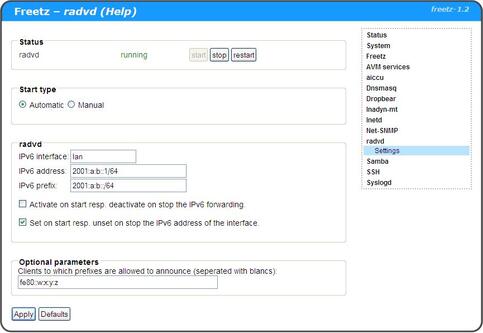radvd 1.9.3/2.20
- Homepage: https://radvd.litech.org/
- Manpage: https://linux.die.net/man/5/radvd.conf
- Changelog: https://github.com/radvd-project/radvd/blob/master/CHANGES
- Repository: https://github.com/radvd-project/radvd
- Package: master/make/pkgs/radvd/
- Maintainer: @fda77
The router advertisement daemon (RADVD) allows to both Linux and Windonws clients to obtain an IPv6 IP address, without any changes on the clients. More info about RADVD can be found via: http://www.litech.org/radvd/
Request a subnet from SixXS
I hope you have enough points left to request a subnet from SixSX. If not, make sure you have Aiccu up for a few weeks, see the creadits FAQ.
You can request a subnet from your SixXS home page At the left on your home page you should find a list of options from which you should select Request subnet.
Creating a Feetz Image with Radvd
Follow the directions from the /wiki/WikiStart.en# Wiki After the following step you can configure the packages you want to have included in your image.
make menuconfig
Make sure the following is selected:
[*] Show advanced options
[*] Enable IPv6 support
Package selection ---> Standard packages ---> [*] radvd (router advertisement daemon)
I also advice to add the following for easier troubleshooting:
Advanced options ---> BusyBox options ---> IPv6 Options ---> [*] ping6 command
Advanced options ---> BusyBox options ---> IPv6 Options ---> [*] traceroute6 command
‘Patching’ Freetz-1.2 with Client config option
Due to an application that is not supported on later versions, I prever to stay on Freetz-1.2. But due to issues with other IPv6 enabled devices, I would like to include enhancement Ticket #1921 also in Freetz-1.2.
With the following commands executed before make you can have this enhancement included also:
cd ~/freetz-1.2/make/radvd/files/root/etc/default.radvd/
wget "/browser/trunk/make/radvd/files/root/etc/default.radvd/radvd.cfg?rev=9419&format=txt" -O radvd.cfg
cd ~/freetz-1.2/make/radvd/files/root/etc/default.radvd/
wget "/browser/trunk/make/radvd/files/root/etc/default.radvd/radvd_conf?rev=9453&format=txt" -O radvd_conf
cd ~/freetz-1.2/make/radvd/files/root/usr/lib/cgi-bin/
wget "/browser/trunk/make/radvd/files/root/usr/lib/cgi-bin/radvd.cgi?rev=9444&format=txt" -O radvd.cgi
Setup in Freetz web-interface
In the setup it is ‘sufficient’ to just configure a /64 from your /48 you received from SixXS. E.g. you can pick the first possilbe /64 range 2001:aaaa:bbbb:0000::/64
Network range - 2001:aaaa:bbbb:0000:0000:0000:0000:0000 - 2001:aaaa:bbbb:0000:ffff:ffff:ffff:ffff
Note In below screenshot enhancement Ticket #1921 is included.
To prevent unexpected reboots I had to unselect the ‘Activate on start resp. deactivate on stop the IPv6 forwarding’ on my FB-7270v3.
Linux Clients
Not much to tell here. The output of ifconfig should show that it recieved an IPv6 address, starting with your configured subnet and ending with part of your MAC address in there.
There should also be a default IPv6 route pointing to the IPv6 gateway (the router).
WinXP Clients
With my WinXP system I had no problems to obtain an IPv6. All I had to do was to was to enable IPv6 with:
netsh interface ipv6 install
Then you should see that you get two IPv6 addresses. One public and a temporary one. You can also see them with:
netsh interface ipv6 show address
Win7 Clients
I have two Win7 systems. One that was not mutch used with IPv6, and one where I used AICCU locally as a service at startup. The one that was not mutch used with IPv6 obtained an IPv6 address immediately. With the other one it took more effort. After modifying the service to only startup manually I didn’t obtain an IPv6 address from RADVD, even after a reboot.
If you have a similar problem you can try the following:
- firt make sure you create a restore point.
-
next use the following commands (note I used both commands without verifying correctly which one was needed):
netsh int ipv6 reset c:ipv6_reset.log netsh interface isatap set state enabled
